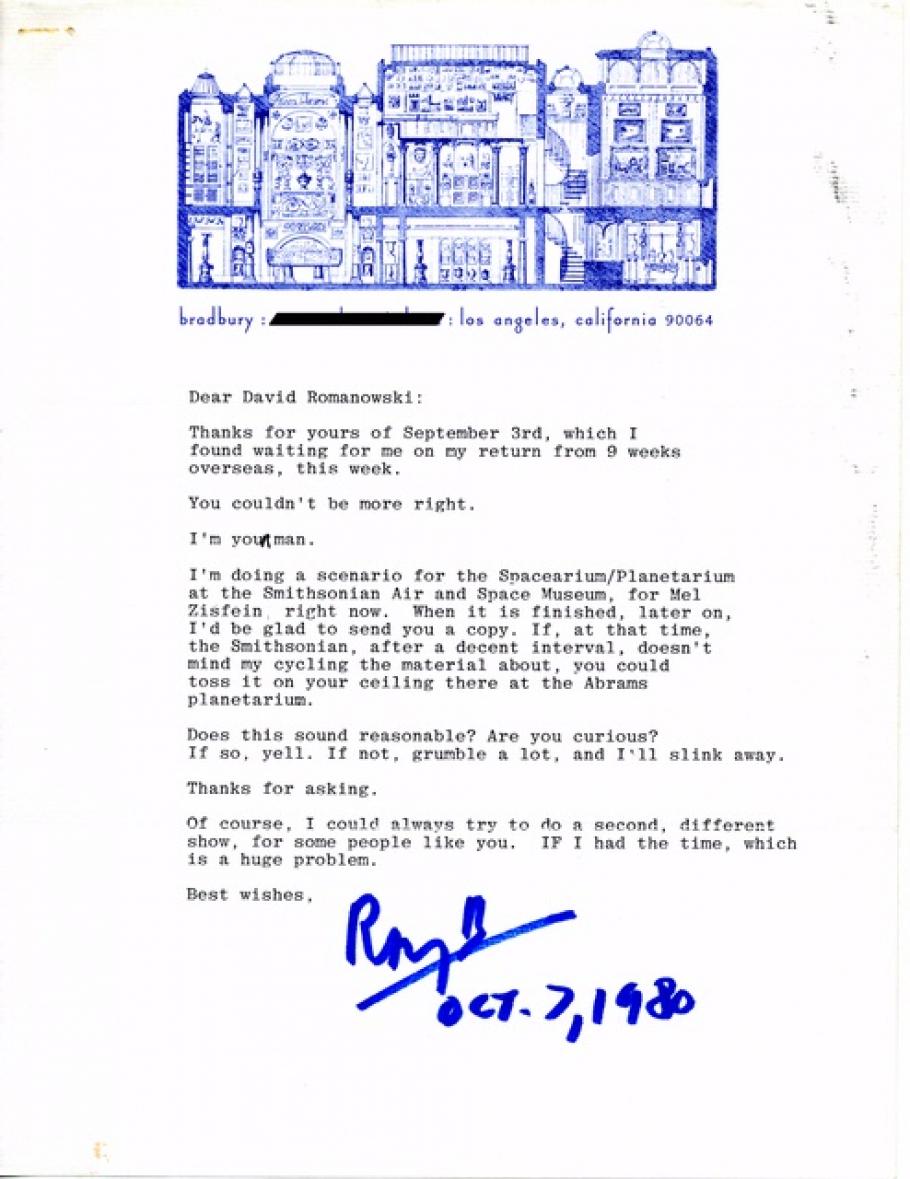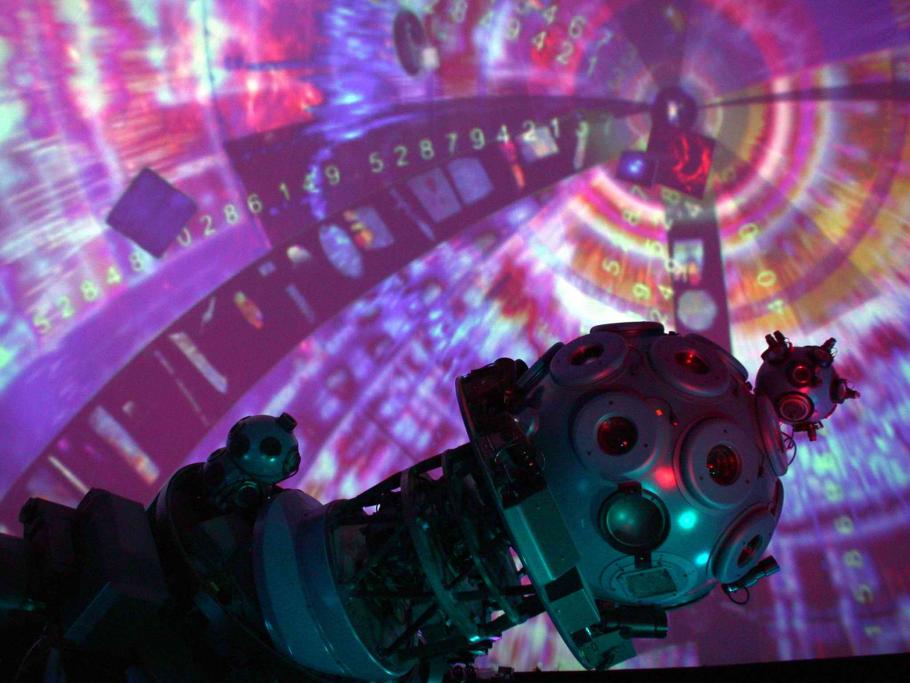When I learned Ray Bradbury died on June 5, 2012, two things came to mind. First, that I ought to pick up a copy of Farewell Summer, which I’d been meaning to read, Bradbury’s late-in-life sequel to my favorite book of his, Dandelion Wine. Second, that I ought to reread that personal letter he sent me 32 years ago, and pull out that batch of papers I preserve in my office here at the Museum that I call the Bradbury Chronicles. Between the letter and the chronicles, there’s a link.
Bradbury wrote the letter in response to a query from me, asking if he might be interested in writing a planetarium show for Michigan State University’s Abrams Planetarium, where I worked as the staff writer. I’m sure I gushed effusively about what a fan I was and how I thought he’d write a terrific show. And I meant it. Bradbury was one of my early writing influences. For a time I even self-consciously tried to mimic his style, with predictable, affected results. Nobody wrote like Ray Bradbury. You can’t mistake his writing for anyone else’s. You love it or you don’t. I once read every book, every word by him I could find. But somewhere around Death Is a Lonely Business, my infatuation with his work began to wane. I haven’t read his fiction in years. Two anxious months later, I finally received his reply. “Thanks for yours of September 3rd, which I found waiting for me on my return from 9 weeks overseas,” he began. “You couldn’t be more right.” “I’m your man.” He said he was already working on a show for “the Spacearium/Planetarium at the Smithsonian Air and Space Museum.” If the Smithsonian didn’t mind, maybe I could “toss it on your ceiling there at the Abrams planetarium.” “Does this sound reasonable? Are you curious? If so, yell. [I did!] If not, grumble a lot, and I’ll slink away.” “Of course, I could always try to do a second, different show, for some people like you. IF I had the time, which is a huge problem.” He signed it in bold, blue magic marker, “Ray B / Oct. 7, 1980.” I was thrilled. I was over the moon. But it wasn’t to be. A few months later, I lost my job, a victim of the recession. My planetarium career was over. Time-travel forward now, 10 years. I had just become the writer-editor in the Exhibits Division at the National Air and Space Museum, a job I still hold. I edit all the words that go into every exhibit. I am also the keeper of the Museum’s exhibit history. My filing cabinets contain all the exhibit label scripts—the words you read when you visit our galleries—for nearly every exhibition, large or small, that’s ever appeared here. As I pored through those files one day, I came across some folders relating to our Einstein Planetarium, originally called the Spacearium. That’s where I found “The Ghosts of Forever: The Great Shout of the Universe!”—the first draft of the planetarium show Bradbury wrote for the Museum in 1981. With it were script reviewers’ comments.
“Many of the phrases are crude and devoid of meaning. Some of it flows nicely, then suddenly it changes and becomes awkward.” “‘Suns that must birth themselves’ reeks with misunderstanding.” “Present concepts do not suggest ‘worlds spun out of flame.’” “Life cooking itself is a poor way of describing/summarizing evolution.” And on and on and on. Four agonizingly detailed reviews. Four thumbs down. Well, I thought, what did they expect? He’s Ray Bradbury not Arthur C. Clarke! He’s a visionary, a dreamer, a romantic, a poet. Yes, in a Bradbury cosmos, the big bang is “The Great Shout of the Universe!” It’s a place where “The Cosmic Nebulae turn on themselves, telling Time.” And “Andromeda spins by, wailing, mourning in the dark.” It’s a universe in which matter “must ghost itself to flesh.” “The Ghosts of Forever” never saw starlight. And Bradbury never forgot. Flash forward again, to 2007 and the Association of Science and Technology Centers conference in Los Angeles. As I perused the conference program, I discovered to my surprise a panel discussion featuring Disney’s Imagineering chief Marty Sklar, film critic Leonard Maltin, and—Ray Bradbury! I had heard Bradbury speak at a conference once before, back in 1980 shortly after he sent me that letter. He had been all I thought he would be. He lit the fuse of my imagination. Today, he arrived in a wheelchair and looked frail and tired. But when he spoke, the old Bradbury resurfaced: inspired, inventive, completely convinced of his own ideas, and a bit feisty. And he had a bone to pick—with those people at the National Air and Space Museum who had rejected his planetarium show! Just because he said the age of the universe was one thing, and they insisted it was another, he fumed, and anyhow he turned out to be right in the end! At least that’s the essence of what I dimly recollect. I knew he wasn’t correct. His version of the story had been warped by the gravitational influences of time and memory. But the point was, even after all these years it still bugged him. Maybe we were the only ones who had ever rejected a Ray Bradbury work as unworthy. The nerve! And so afterward, as I stood in a reception line with a program handout for him to sign, I knew what I had to tell him. I would have only a few seconds with him, so I had to make them count. When my turn came and I handed him my paper to sign, I told him I was from the National Air and Space Museum, and believe it or not, that planetarium show script he had written? It was still safely filed away in a folder in my office. In the blur of the moment, I honestly don’t recall how he responded. But I do remember what he said when I told him I wished I had brought my treasured paperback copy of Dandelion Wine for him to sign. He looked up at me and his eyes brightened. “They made a play of it!” he exclaimed. “It’s playing right now in Pasadena! You must see it! Go!” To which I could only reply, “I will!” I had to disobey his command, but I left Los Angeles satisfied. I felt I had brought the Bradbury Chronicles to a close, along with the circle of my own personal Ray Bradbury saga. I’d let him know that the planetarium show script he wrote 26 years earlier, that he mentioned in his letter to me, that he obviously was so proud of, had not simply ended up in the trash. Someone at the National Air and Space Museum had thought to preserve it, so someone like me could discover it, and whoever comes after me. So anyhow, thanks for reading this. I have to go. I have a book on hold at the library, and an old friendship to renew.

